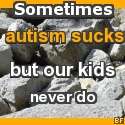
Over the years, I have witnessed an exodus of sorts when it comes to the education of friends' children. More and more parents of children with autism and Asperger's Syndrome are choosing to homeschool. We are the well-kept dirty little secret that your school district doesn't want you to know: often our children can be better served at home than in the school system.
I would have never said such six years ago. I was a died-in-the-wool PTA, room mom, get into the system and change it, agent. But one horrific year with my son's classroom (through no fault of the teacher) and I became a true believer. I figured I couldn't do a worse job than the school, and I might even be an improvement. Besides, my son hated school, to the point I was literally dragging him there. Something had to give.
And now? I homeschool all three of my children, and this is our 5th year. Two have been diagnosed with high functioning autism, they are 7 and 10 respectively. My oldest is going on 15, and though she has never been diagnosed, she has many of the deficits of Asperger's, and is also academically gifted. Her father is a computer engineer, and is most likely also on the Spectrum. (he was never tested, but off the record, our psychologist said so) So, you do the math...
In any case, bringing my children home has worked out wonderfully for us. Homeschooling has allowed me to tailor each program according to what works for each child. My 14 yr old, who went to school for 6 years benefits from a very academic program. She enjoys the structure and it works. My middle guy, at 10, is the one I walk the line with. He isn't unschooled, but his academic structure would, at first glance, seem more relaxed. It is still very scheduled, however. But we benefit from frequent breaks, sensory diet and multisensory approaches. I can choose activities that he enjoys, and we keep work periods short and focused. He can take a break for pogo stick or OT work, as needed. My littlest one, at 7, is the one that learns best through games and Mom Time. She needs one-on-one (as does my son) that she wouldn't get in a classroom. She often has to be taught a concept repeatedly before she gets it.
My middle guy is also dyslexic, which makes it interesting, and I am thinking my littlest may be, as well.
As for socialization...which is a joke anyway... but still. We have found with 
There is a park day we attend and have for years. The attendance is large, with many different ages and multiple abilities. There are several kids from all ages that  are on the spectrum in varying degrees. It is a very welcoming group. Truly, it was the best decision we ever made for our family.
are on the spectrum in varying degrees. It is a very welcoming group. Truly, it was the best decision we ever made for our family.
When my son ended 1st grade, he barely read, was behind in math, his writing was still reversals (though he is left handed, so that made it worse). I would literally dress him like a doll and drag him, kicking, to the public school. He would sit under the teacher's desk, or make games. His aide was useless, only serving to keep him from eloping from the classroom. His work was all sent home. I was already homeschooling, and my son was in the school system!
He is now in the 5th grade, and reads at grade level. His math is also at grade level, or just below. He is above in Science, History, Geography. His writing and penmanship has improved 10 fold. and most importantly, he loves to learn. I have found that learning is a broad term for what we do every day. Mythbusters is learning and exploring Science. Going to the Arboretum is a chance to discuss the environment and botany, as well as the food chain. In fact, every activity has inherent learning in it...you just have to find it.

The most important thing to remember about homeschooling? It isn't something you do. It's something you live. And there really is no wrong way to do it. You can, and your child can... and if it doesn't work, keep tweaking. Also, what your state standards may find important, you may find doesn't mesh with your family. That's ok. I have found that as we go, my kids pick up information I didn't formally teach. And the one thing I want to equip my children with? The ability to find information.
The freedom I have found, as well as the free time away from IEPs, discipline meetings and just general headache is now energy I can pour into helping my son love learning. Less time is spent arguing over what the schools think he needs and more time is given to what he actually needs. We have personalized his goals, and we make sure he reaches them. There is no fighting with autism experts who insist my son is meeting goals that are either too broad, too easy or just plain wrong. I am in control. And my children are the better for it.
That, to me, is success.
T. Tina Cruz is a writer, wife and mother of three children. The two youngest children have high-functioning autism and the oldest has undiagnosed Asperger's Syndrome. She advocates for autism awareness and education, as well as acceptance. She views autism as a growth process and the opportunity to connect parents for support as a privilege. She is the editor of the Special Needs channel at Typeamom. Her personal blog can be found at Send Chocolate.





